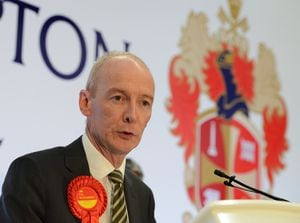Lifeline plea to help save at-risk firms
Ministers have been urged to pump financial support into the manufacturing sector in a bid to keep the region's firms afloat during the energy crisis.

MPs and business leaders today warned that without immediate action some factories in industries including steel and chemicals will be forced to cease production due to spiralling gas prices.
Tensions have ramped up over the handling of the crisis amid a row between government departments, with Boris Johnson now expected to back a package to help energy-intensive industries.
Labour's Shadow City Minister Pat McFadden said the energy crisis impacting consumer bills was now a full blown "jobs crisis" facing firms.
The Wolverhampton South East MP said there would be a huge long term cost of "standing back" and allowing industries to go to the wall.
"The key thing is for the Treasury and the Business Department to sit down properly with these industries to get to the bottom of what they really need to keep going and not for the unseemly squabbling we saw between government departments over the weekend to continue," he added.
Jonathan Dudley, from Midlands-based business advisory group Crowe, said without the right support the hike in power prices could have a "devastating" impact on industry.
"It will make food, goods and travel more expensive as well as jeapordise livelihoods," he said.
Gareth Stace, head of UK Steel, said that without immediate action, the energy crisis of today "will fast become the steel industry crisis of tomorrow".
Business minister Lee Rowley held a meeting with industry representatives yesterday and was due to meet steel bosses today.
Measures set to be under consideration include a price cap on energy for businesses.

Soaring energy prices piling the pressure on
Sky-high energy prices are forcing up household bills and threatening the future of some of Britain’s key industries.
So the last thing the country needs is a row between government departments over how to handle a crisis that could end up having a devastating impact on many aspects of our lives.
But that is exactly what appears to be happening after a bizarre stand-off between Business Secretary Kwasi Kwarteng and the Treasury.
Mr Kwarteng had announced he was speaking to government colleagues “particularly in the Treasury” to find a way through the crisis, only for a Treasury aide to come out and say the department was not “involved in any talks”.
Unsurprisingly, the situation – added to a distinct lack of progress since a key meeting with ministers last Friday – has left business leaders mightily concerned.
Dave Dalton, chief executive at British Glass, said that while Friday’s meeting “seemed to prick the ears” of the Business Secretary, it had been hoped that the dialogue “would be extended” over the weekend and into yesterday.
“It’s very alarming to hear the Treasury are making denials over the approach, let alone anything else,” he added. “We need immediate action.”
Gareth Stace, director general of UK Steel, has thrown his two penn’orth in, calling on the Prime Minister to “bang ministerial heads together” to avoid an industry crisis hitting his sector.
Since the start of the energy crisis Mr Kwarteng has pledged to keep an energy price cap in place to help households struggling with rising costs.
But up to now he has offered no new support for businesses, prompting some MPs to call for help to prevent them going under as wholesale prices continue to soar.
Reports now suggest The Treasury is mulling over an industry support package that has been backed by the Prime Minister.
Shadow City Minister Pat McFadden, Labour MP for Wolverhampton South East, said ideology “must not get in the way” when the Government is trying to resolve the crisis.
“Having supported the economy through the pandemic, it would be tragic now if we stood back and let these key industries go to the wall,” he said. “They’re asking for help and it’s really important that the Treasury and the Business Department stop fighting with one another and get around the table and get to the bottom of what these industries really need.”
He said the energy crisis facing consumer bills was now a “jobs crisis” facing a number of key industries like steel, ceramics, glass and paper making.
“Of course in any appeal for Government help it’s right that the Treasury considers value for money,” Mr McFadden added. “That’s its job. But value for money is not just about the immediate cost of any help given right now. It’s also about the longer-term cost to the country of standing back and allowing these industries to go to the wall.
“What would that mean for our manufacturing capacity, for jobs, for reliance on imports, for lost tax revenues and higher benefit payments? The Treasury has to consider all these things, not just the immediate cost.”

The cost of a proposed package to support the steel industry is believed to be about £50 million – a figure Mr McFadden said was “not a huge sum if it was the difference between saving the UK steel industry or not having one in the future”.
Mr Stace urged the Government to follow the lead of countries such as Portugal and Italy and “alleviate” short term pressures. “Their governments are already investing many billions of euros to help their industries and the UK government has yet done nothing,” he added.
Meanwhile, Adam Scorer, chief executive of National Energy Action, said consumers also desperately needed more protection from rising prices. He said the Government would need to “put some more cash in the pockets of the financially vulnerable households”.
He added: “At the moment we’ve got some mechanisms which are there to protect consumers – the price cap, certain rebates, other mechanisms, but they’re for a well-functioning, competitive, energy market.
“They’re not fit for the challenge of the cost-of-living crisis that we face at the moment.”
Gas prices have rocketed by 250 per cent this year. Although households are partly shielded from the rise by a price cap, customers are likely to be hit with massive hikes in the spring.





